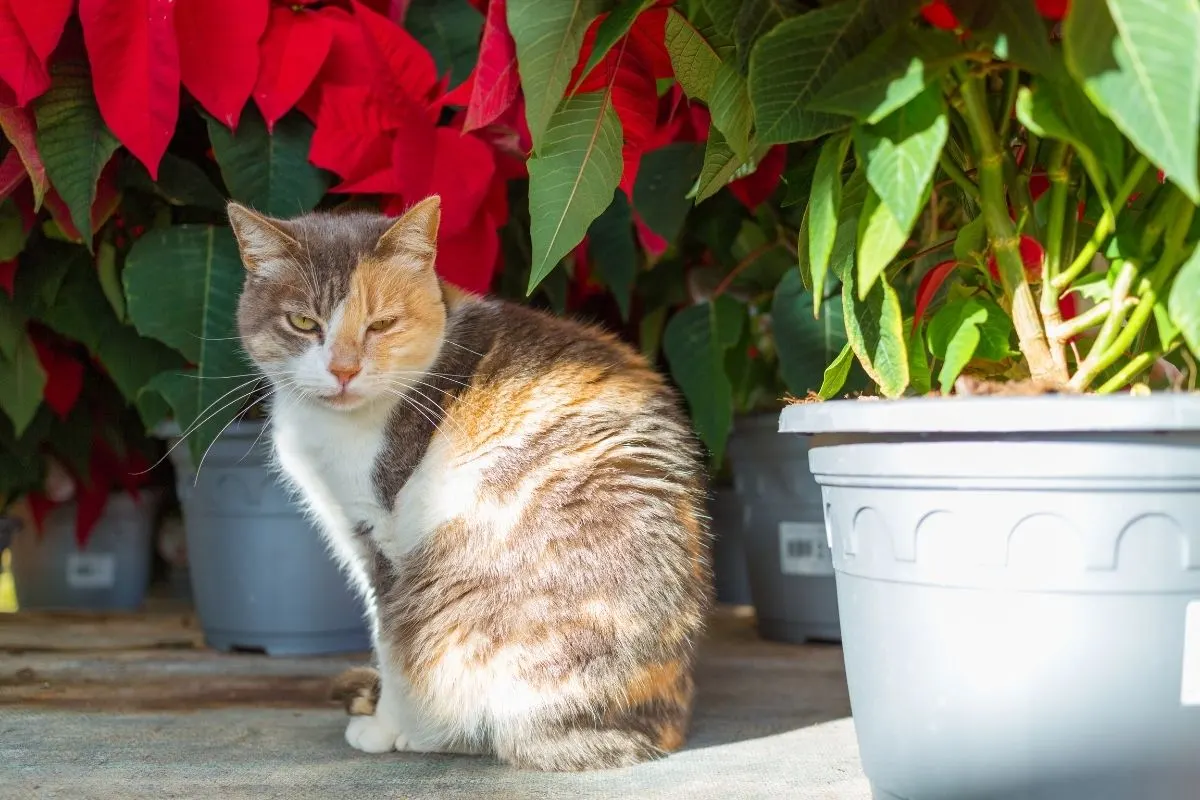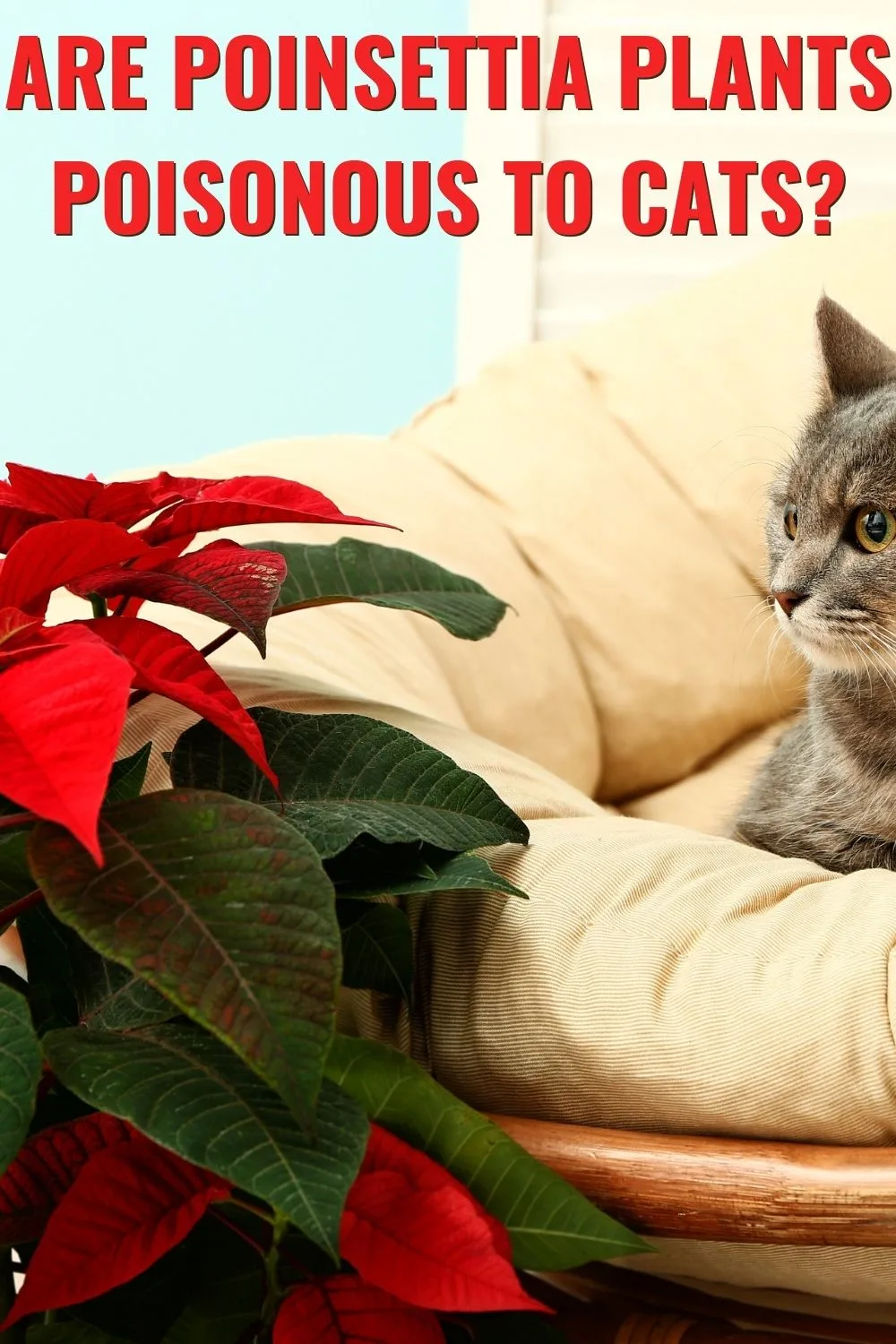Are poinsettia plants poisonous to cats? This is a common question many cat owners ask when they want to keep their beloved pets safe during the holiday season while these plants are popular. Poinsettias have beautiful red flowers and are very popular around Christmas. Their striking color makes them a perfect decoration for tables and rooms decorated for Christmas. As always, when adding plants to the home, we must consider our cats’ safety.
Poinsettia plants have a milky sap that appears due to plant damage. It is irritating to the skin, causing a burning itch. It has diterpenoid euphorbial esters and saponin-like steroids. It is mildly toxic and causes hypersalivation, a burning sensation in the mouth, vomiting, and diarrhea.

Knowing the facts about poinsettia toxicity will help you decide if you are happy to keep these plants in the home or garden when you have pet cats.
I Heard Poinsettias Are Fatally Toxic – Is This True?
Poinsettias used to be regarded as highly toxic, but this is not true. The myth that poinsettias are poisonous enough to kill you arose from an incident in 1919. A young child in the USA died, and the authorities mistakenly ruled the cause of death as the ingestion of a poinsettia leaf (Euphorbia pulcherria).
Poinsettias are part of the Euphorbia family, and many other Euphorbias are highly toxic. Some people have erroneously concluded that poinsettias must also be deadly.
Many people also feel that red plants are nature’s way of warning us about a plant’s toxicity. Although some red plants may be toxic, not all red plants are poisonous. If they were, everyone who smelled a rose would be dead.
That said, these festive plants are harmful to your feline friends and it’s your job as a responsible pet parent to keep them safe from them.
Cats and dangerous plants
When we understand cat behavior better, we can see how they often don’t know how to stay away from things that cause them harm. Have you ever heard the expression “Curiosity killed the cat”? This is based on the idea that cats are very curious creatures and they want to explore the world around them.
For your pet cat, this world is your home and it’s important you keep it safe for them. Cats will often sniff, lick, chew, scratch, or rub against the surfaces around them as a way of learning more about them. And some cats are very curious about plants. However, some plants, like the poinsettia, are toxic to your cats.
How Toxic Are Poinsettia Plants To Cats?

Poinsettias are only mildly toxic to cats. Studies have shown that most cats and people will not show any reaction to accidental exposure to poinsettia. A small percentage may experience some symptoms, but these usually pass without causing further damage.
Ohio State University did a study in 1971 which showed that poinsettia plants did not cause toxicity to cats.
Cats do not show any particular species-specific sensitivity to poinsettia plants.
What Are The Toxins In Poinsettia Plants?
Poinsettia plants belong to the Euphorbia plant family, which has a protective mechanism. The plants ooze a milky sap which is irritating to the skin if they are damaged. Fortunately, the sap is also extremely bitter, which discourages cats and most animals from ingesting it.
The sap contains latex and could exacerbate the irritation for any cat or human allergic to latex. If your cat brushes against the plant, it is unlikely to have any reaction as the sap is only present when the plant is broken.
Poinsettia plant sap contains diterpenoid euphorbial esters that cause irritation and burning sensations. This is what most people and animals react to when they have symptoms from contact with the plant.
The sap also contains steroids that have saponin properties. Saponins function like a washing detergent, have a soapy feel and can cause foaming and vomiting.
What Symptoms Will My Cat Have From Poinsettia Plants?
As previously mentioned, any symptoms seen will be mild and will disappear without further harm.
- If your cat breaks a leaf, twig, or stem of the poinsettia, and some sap touches it, there may be some irritation or burning at the site. This will be worse for hairless cats, such as the Sphynx, Elf, or other hairless breeds. Cats with regular coats may not show any reaction.
- If your cat licks some of the sap or licks his coat after contact with poinsettia sap, it will experience a burning sensation in the oral mucosa. The cat will salivate, paw at its mouth, and may want to drink water. Some cats may try to drink, only to jerk away because of the inflammation of the oral tissues.
- Cats do not generally eat plants or chew on leaves. If your cat eats parts of the poinsettia plant, you will see the above symptoms as well as vomiting. Vomiting is caused by the saponin-like steroid in the sap, creating foam in the stomach that causes the cat to retch.
- Diarrhea may occur after ingesting poinsettia plants, but it is not a common symptom.
Your cat could have anything from mild stomach upset and abdominal pain to kidney failure from toxic plants. Although poinsettia doesn’t usually cause severe symptoms in cats, that doesn’t mean you should take any chances with this poisonous plant in your home. Even many humans get skin irritation from the plant.
What should I Do if my cat has contact with poinsettia sap?
If your cat has contact with poinsettia sap, the best option is to wash it off. Use a running hose or shower attachment to wash the area thoroughly. A mild shampoo may be used if you feel there is still sap residue on your cat’s coat.
If your hairless cat has a more intense reaction, you should wash it and then apply an ice pack to the irritated skin for ten to fifteen minutes.
What should I do if my cat gets poinsettia sap in its eye?
The eye tissue is very sensitive to foreign bodies and chemicals, so it will probably be extremely painful, and the eye will produce copious amounts of tears. Do not panic. Use a syringe, shower hose, or squeezy bottle and rinse the eye thoroughly with plain water. Some people recommend flushing the eye with milk.
My Cat Ate Poinsettia Plant – What Now?
Wash out the cat’s mouth with a syringe or squeezy bottle as it will probably be burning. It is critical that you do not cause your cat to aspirate water – take water into the lungs. You can cause pneumonia or even drown your cat!
You do not need to take further action unless you see that your cat is distressed, but you can follow these guidelines if you are concerned.
If your cat is vomiting after ingesting poinsettia, try to monitor how much of the plant comes back out. If you suspect there is still more plant in the cat’s stomach, or if it is not vomiting, you can induce vomiting in your cat, if you feel comfortable.
It’s always best to contact a vet for advice unless you are trained and experienced with this. When in doubt, if you suspect poisoning, you can always call the Animal Poison Control Center for advice at (888) 426-4435.
Are Poinsettia Plants Poisonous To Cats? – Conclusion
Poinsettia plants are cheerful decorative plants to have in the home. However, you can see that they are mildly toxic to cats and other pets, like dogs. While most cats will stay away from them, if you have a cat very prone to eating plants, you may not want to take the chance. If you feel confident you can keep the plant away from your cat and your cat shows no interest in it, then you may feel comfortable having this holiday plant in your home.
Although they’ve gained a bad reputation with plant enthusiasts and plant owners, they are not typically as dangerous as most people have come to believe.
This popular holiday plant can be dangerous to your feline friends, so if you want to be 100% sure no accidents happen, it’s best not to bring them into your home at all. There are plenty of other non-toxic plants you can use instead. What are some of your favorites?

Adriana Copaceanu is a passionate nature lover living in the country on her dream property where she grows vegetables, lavender, and wildflowers that she shares with the wildlife they attract. When she's not in the garden, she loves spending time with her chickens and planning her next nature project. Check out her books below:
How to Grow Lavender for Fun and Profit: Lessons Learned from Planting Three Hundred Lavender Plants
